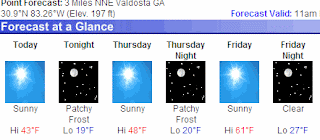 Doggone Arctic Air! I am so tired of winter! I am fed up with the cold! I am sick of not feeling my toes! I am tired of my runny nose! I am tired of layers upon layers of clothes! This is south Georgia! Uh, hello Ma Nature, SOUTH Georgia! It's not supposed to be below freezing for days in a row. We aren't supposed to have a feels like temperatures in Georgia ranging from the teens (here) to as low as negative°. Check out this morning's 9AM readings locally.
Doggone Arctic Air! I am so tired of winter! I am fed up with the cold! I am sick of not feeling my toes! I am tired of my runny nose! I am tired of layers upon layers of clothes! This is south Georgia! Uh, hello Ma Nature, SOUTH Georgia! It's not supposed to be below freezing for days in a row. We aren't supposed to have a feels like temperatures in Georgia ranging from the teens (here) to as low as negative°. Check out this morning's 9AM readings locally. As much as I hate it for myself, at least, I am able to get inside where there is power for heat. My heart just aches for the folks in those central states who have been dealing with the power outages since the ice storm over a week ago. How do you deal with temperatures in the teens or worse when you have no heat? God bless them.
As much as I hate it for myself, at least, I am able to get inside where there is power for heat. My heart just aches for the folks in those central states who have been dealing with the power outages since the ice storm over a week ago. How do you deal with temperatures in the teens or worse when you have no heat? God bless them.
Today is day 4 of Severe Weather Awareness Week in Georgia, and today's topic is Tornadoes! As a storm chaser, I must admit that I have a peculiar obsession with tornadoes. I study them. I find them fascinating. That is not to say that I want them to happen and destroy and kill. That is absolutely FALSE! I do not want them to harm people at all, but as they exist, they fascinate me, and I do hope to get out to the plains this year to witness (at least) one that doesn't harm anyone or anything. Tornadoes are violently rotating columns of air, extending from the thunderstorm that is in contact with the ground. Tornadoes can vary in shape, size and intensity. Most tornadoes are weak, lasting a few minutes and producing winds of less than 100 mph. However, a few tornadoes are strong or even violent. These tornadoes last from 20 minutes to over an hour and can produce winds of between 100 and 300 mph.
In Georgia, we have an average of 6 tornadoes reported annually. Unfortunately, 2008 was a banner year in Georgia as 63 tornadoes actually occurred.  Five lives perished as a result of these tornadoes in Georgia. Tornadoes usually occur from March to May in the mid afternoon to early evening, but they can occur at any time of year during any time of day. Unfortunately and dangerously, here in Georgia, the bulk of our tornadic supercells are heavily precipitated, which makes tornadoes quite obscured and horribly dangerous. 2008 was an exceptional year nationally for tornado incidences. The actual tornado count for 2008 stands at 1690 tornadoes, blowing the 10-year-average of 1270 out of the water.
Five lives perished as a result of these tornadoes in Georgia. Tornadoes usually occur from March to May in the mid afternoon to early evening, but they can occur at any time of year during any time of day. Unfortunately and dangerously, here in Georgia, the bulk of our tornadic supercells are heavily precipitated, which makes tornadoes quite obscured and horribly dangerous. 2008 was an exceptional year nationally for tornado incidences. The actual tornado count for 2008 stands at 1690 tornadoes, blowing the 10-year-average of 1270 out of the water. All of these fascinating statistics and charts are available at this SPC link.
All of these fascinating statistics and charts are available at this SPC link.
So, what can you do to protect yourself and your loved ones from these potentially deadly violently rotating columns of air? (Another great question!)1. The best thing to do is to have a plan of action in place before threatening weather develops.
A statewide tornado drill took place this morning, allowing schools and others an opportunity to test their plans and teach others about what to do in the event of a tornado warning. I hope that all schools in Georgia participated in this practice drill.
2. Know the difference between a watch and warning.
(A Tornado Watch means conditions are favorable for tornadoes to develop, but there is not an imminent threat. A Tornado Warning means a tornado has been detected and an imminent threat to life and property has developed. )
3. Know your area so you can track storms, listen to a weather radio, local TV or radio reports. Make sure you have battery backup.
4. Monitor area forecasts to know if threatening weather is possible when you are planning outdoor activities.
5. If a tornado is imminent and you are in a home or building, move to a pre-designated shelter on the lowest floor, such as a basement, or a small interior room closet, bathroom or hallway - and get under a sturdy piece of furniture. Remember to always put as many walls as possible between you and the outside.
6. Stay away from windows.
7. Get out of automobiles!
(Do not try to outrun a tornado in your car. If you are caught outside or in a vehicle lie flat in a nearby ditch or depression, but be aware of possible flooding, and cover your head with your hands. Do NOT go under an overpass!)
8. Mobile homes offer little protection from tornadoes.
(You should leave a mobile home and go the lowest floor of sturdy nearby building or a storm shelter.)
Have a great day!
~Dewdrop
Wednesday, February 04, 2009
Preparing for the worst...
Labels:
Severe Weather Awareness Week
Subscribe to:
Post Comments (Atom)





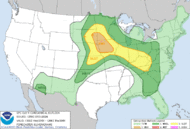
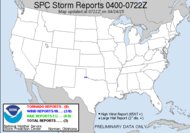





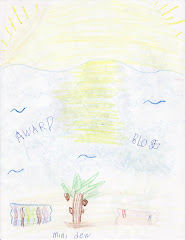









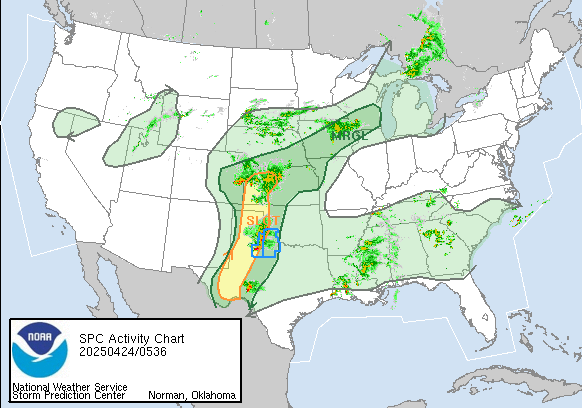
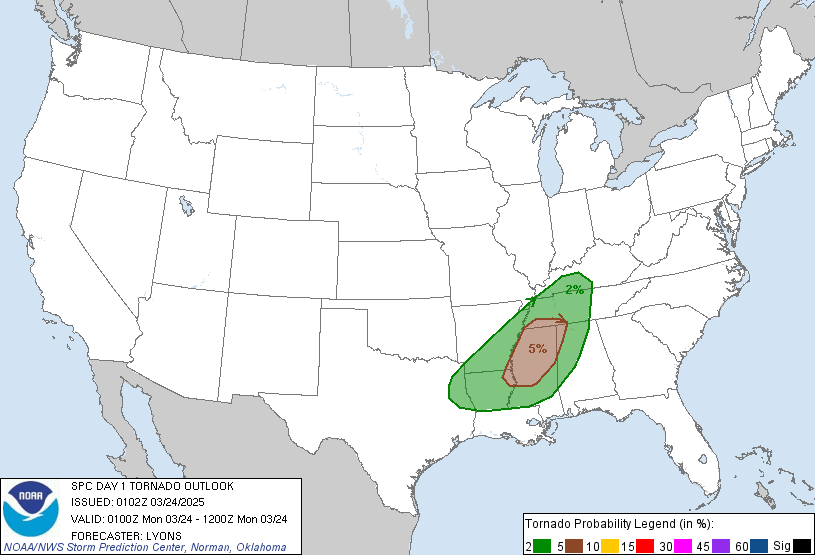

Dew, you crack me up! I suppose it has been on heck of a Winter down there for you all. You'll pull through. It's gonna be 40 up here on Monday... I would suspect it'll be quite warm in your area. :)
ReplyDeleteBrr... Hang in there!! =)
ReplyDelete